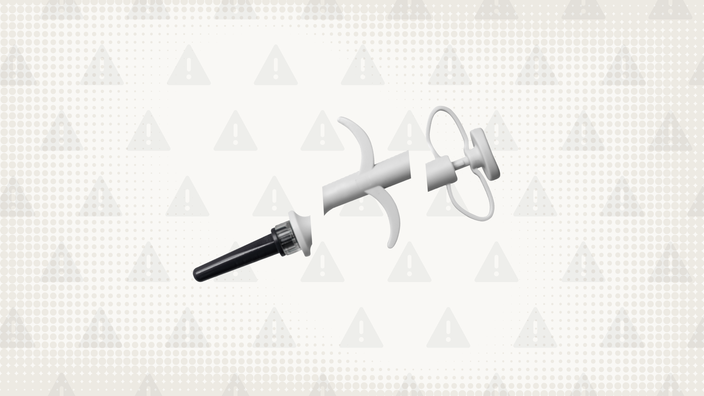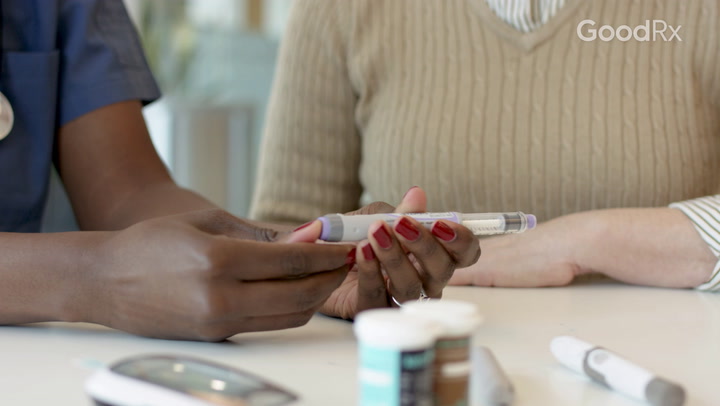
9 Cimzia Side Effects and How to Manage Them
Key takeaways:
Cimzia (certolizumab pegol) is a biologic medication. It treats autoimmune disorders such as Crohn’s disease and rheumatoid arthritis in adults.
Cimzia’s side effects are generally mild and include upper respiratory tract infections, urinary tract infections, and skin rashes. Headaches and injection site reactions can also happen.
Serious Cimzia side effects, including serious infections and cancer, have been reported on rare occasions. Reach out to your healthcare professional about any Cimzia side effects you’re concerned about. They can provide tips on how to manage them.
Access savings on related medications
Table of contents

Cimzia (certolizumab pegol) is a biologic medication that’s available with a prescription. It lowers inflammation for a variety of autoimmune disorders in adults, such as Crohn’s disease and rheumatoid arthritis. You can conveniently administer this subcutaneous (under the skin) injection into your thigh or stomach on your own — no need to go to a clinic or hospital for an infusion.
Cimzia is effective for many people who use it. But potential side effects are likely on your mind if you’re new to taking it. Knowing which Cimzia side effects to expect and how to manage them can set you up for a successful treatment.
Cimzia side effects at a glance
Like all medications, Cimzia can cause side effects. They’re mild for most people. But serious side effects have also been reported. Keep in mind people may experience other side effects not listed below.
Common Cimzia side effects include:
Upper respiratory tract infections (URTIs)
Urinary tract infections (UTIs)
Joint or back pain
Cough
Fever
Skin rashes
Headache
Injection site reactions
Cimzia can also cause rare but serious side effects, such as:
Serious infections
High blood pressure
Heart failure
Blood disorders
Hypersensitivity reactions, including anaphylaxis
Cancer
Nerve conditions
Below, we’ve provided a guide to nine noteworthy Cimzia side effects and how to manage them.
1. Infection, including respiratory infections and urinary tract infections
Cimzia has immunosuppressant effects. It partially weakens your immune system by design. This helps manage autoimmune disorders, but in turn, it makes it harder for your body to fight infections. That’s why you may experience URTIs or UTIs after starting it.
URTIs typically cause common cold symptoms. Most of these symptoms should clear up on their own after a few days. But if they’re not improving within 10 days, or if they’re severe or getting worse, you may need to receive treatment.
However, if you experience any UTI symptoms, such as pain or burning when you pee, a visit to your healthcare professional (HCP) is recommended. It’s not recommended to wait it out. Your HCP may prescribe a treatment to clear up the infection.
Good to know: Vaccines are designed to prevent infection. But live vaccines specifically are risky with Cimzia. These vaccines contain a live, weakened form of a virus that could potentially cause an infection in people taking immunosuppressants. It's best to receive live vaccines, such as the measles, mumps, and rubella (MMR) vaccine, at least 2 weeks (14 days) before starting Cimzia or 3 months after stopping it.
2. Injection site reactions
Injection site reactions are possible with any injectable medication, including Cimzia. While they can be uncomfortable, it’s normal to experience these symptoms near the site of your injection after administering a dose:
Redness
Pain
Swelling
Bruising
Skin discoloration
These symptoms are typically short lived. But applying an ice pack to the affected area and taking an over-the-counter (OTC) pain reliever — such as acetaminophen (Tylenol) or ibuprofen (Advil, Motrin) — can help relieve discomfort in the meantime.
Your HCP can also provide strategies to lessen the chance of experiencing injection site reactions moving forward. For instance, rotating injection sites is one idea. Your Cimzia injection should be given at least 1 inch from the last area you injected it. And make sure each injection is at least 2 inches away from your belly button (if you’re injecting it in your abdomen).
3. Skin rashes
Skin rashes are a relatively common Cimzia side effect. They’re mild in most cases. But if you also experience hives or difficulty breathing, you may be having a severe allergic reaction to Cimzia. In this case, call 911 or have someone take you to the nearest ER.
To play it safe, reach out to your HCP if you develop a rash while using Cimzia. They can advise you on next steps. If you’re told to keep taking Cimzia, there are a variety of OTC rash medications they may recommend. The topical steroid hydrocortisone is one go-to option. If itching is more of an issue, the oral antihistamine diphenhydramine (Benadryl) may help too.
Good to know: Cimzia’s prefilled syringe includes a protective needle shield. This plastic shield contains an ingredient similar to natural rubber latex. This could cause an allergic reaction if you have a latex allergy.
4. Headache
Some people experience headaches with Cimzia. It’s actually quite common among tumor necrosis factor (TNF) inhibitors — the group of biologics Cimzia belongs to. Typically, these headaches are mild and go away as your body gets used to the medication. However, certain autoimmune disorders can also increase the risk of headaches in general.
Staying hydrated, exercising, and getting a good night’s sleep are all strategies that can prevent and alleviate headaches. Avoiding dietary triggers and reducing stress (when possible) are beneficial, too. When needed, you can also turn to an OTC pain reliever, such as acetaminophen.
5. Elevated blood pressure
Cimzia may raise your blood pressure. This tends to happen more among people who already have hypertension (high blood pressure).
What’s more, certain medications can raise your blood pressure even higher when combined with Cimzia. Corticosteroids, such as prednisone, are one example. Nonsteroidal anti-inflammatory drugs — like ibuprofen — are another.
Depending on your situation, your HCP may recurrently monitor your blood pressure throughout Cimzia treatment. They may encourage you to check it at home, too.
6. New or worsening heart failure
Heart failure happens when your heart doesn’t pump blood very efficiently. This can cause fluid to build up in your body, among other effects.
In rare cases, TNF inhibitors may cause or worsen heart failure symptoms. But the risk of heart failure from Cimzia appears to be low overall.
Still, keep an eye out for heart failure symptoms such as shortness of breath, swelling, or dizziness. Your HCP may occasionally run tests, such as an electrocardiogram, to check how well your heart is working while you’re receiving Cimzia.
7. Serious infection
While many infections with Cimzia are relatively mild, some can become severe. Cimzia carries a boxed warning, the FDA’s most serious type of medication warning, about the risk of serious infections.
Certain factors can raise the risk of developing a serious infection. This includes having multiple chronic health conditions, taking other immunosuppressants, or being 65 years or older. Your HCP will likely recommend pausing or stopping Cimzia if you experience these any symptoms of a serious infection, including:
Severe or persistent cough
Fever
Chills
Shortness of breath
Sudden nausea and vomiting
Diarrhea
Unusual fatigue
Stomach pain
Yellow skin or eyes
Red skin or sores
Tuberculosis
Before starting Cimzia, your HCP should test you for latent tuberculosis (TB). Latent TB means TB-causing bacteria are in your body but aren’t causing symptoms.
Why does this matter? Latent TB can become active down the road (“reactivate”) if your immune system can’t stop the bacteria from growing. That’s why if you test positive for TB, you’ll receive treatment before starting Cimzia. Your HCP will also test you for TB recurrently throughout Cimzia treatment.
8. Rare reports of cancer
Cimzia carries a boxed warning about an increased risk of certain cancers, such as lymphoma and skin cancer. This is rare overall.
Your HCP will be in charge of watching for any signs or symptoms of cancer. But you can look after your own health, too. Keep an eye out for lymphoma symptoms such as swollen lymph nodes, tiredness, and unexplained weight loss. And take note of any moles, bumps, or sores that aren’t normal for your skin.
There is some conflicting evidence about this risk, though. Some research suggests that TNF blockers don’t actually elevate the risk of cancers such as lymphoma. Certain autoimmune disorders may also slightly raise the risk of cancer in general.
9. Nerve conditions
In rare cases, TNF inhibitors such as Cimzia can cause new or worsening nerve conditions. Multiple sclerosis, optic neuritis (eye nerve swelling), and Guillain-Barré syndrome (autoimmune nerve condition) are a few examples.
Keep an eye out for any nerve-related symptoms, such as dizziness, vision problems, or weakness in the arms and legs, while you’re taking Cimzia. If you have any pre-existing nerve conditions, your HCP may recommend avoiding Cimzia altogether.
When to contact a healthcare professional about Cimzia side effects
It’s natural to feel overwhelmed if you experience side effects from Cimzia. Know that your HCP is on your team to help address any concerns. Reach out at any point to inquire about Cimzia side effects that are bothersome or aren’t getting better. They’ll help you decide the next steps to take.
Sometimes, certain side effects are a sign of more serious issues. Let them know if you experience any signs or symptoms of a serious infection — like a bad cough or fever. If you experience trouble breathing, call 911 or seek medical attention right away.
The bottom line
The most common Cimzia (certolizumab pegol) side effects are skin rashes, upper respiratory tract infections, and urinary tract infections. Serious side effects, including reports of cancer and tuberculosis, have also been reported on rare occasions. Contact a healthcare professional (HCP) about any Cimzia side effects that you’re concerned about. They can offer advice about how to manage them.
Why trust our experts?



References
Arthritis Foundation. (n.d.). Rheumatoid arthritis and cancer risk.
Bosch, X., et al. (2011). Monoclonal antibody therapy-associated neurological disorders. Nature Reviews Neurology.
Centers for Disease Control and Prevention. (2023). Altered immunocompetence general best practice guidelines for immunization.
Kim, P. J., et al. (2023). A systematic review and meta-analysis of injection site reactions in randomized-controlled trials of biologic injections. Journal of Cutaneous Medicine and Surgery.
Li, M., et al. (2023). Characteristic analysis of adverse reactions of five anti-TNFɑ agents: A descriptive analysis from WHO-VigiAccess. Frontiers in Pharmacology.
Mercer, L. K., et al. (2022). Risk of lymphoma in patients exposed to antitumour necrosis factor therapy: Results from the British Society for Rheumatology Biologics Register for Rheumatoid Arthritis. Annals of Rheumatic Diseases.
Pasadyn, S. R., et al. (2020). Cutaneous adverse effects of biologic medications. Cleveland Clinic Journal of Medicine.
Singh, J. A., et al. (2011). Adverse effects of biologics: A network meta-analysis and Cochrane overview. The Cochrane Database of Systematic Reviews.
UCB, Inc. (2023). Cimzia [package insert].
Was this page helpful?
Related Articles
Browse medications
View AllResearch prescriptions and over-the-counter medications from A to Z, compare drug prices, and start saving.















